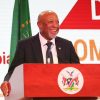Omanyano ovanhu koikundaneki yomalungula kashili paveta, Commisiner Sakaria takunghilile
Veronika Haulenga
Omanyano ovanhu koikundaneki yomalungula kashili paveta, Commisiner Sakaria takunghilile
Veronika Haulenga
Listeners:
Top listeners:
-
play_arrow
Omanyano ovanhu koikundaneki yomalungula kashili paveta, Commisiner Sakaria takunghilile Veronika Haulenga
Being financially prepared and resilient when facing a health challenge

By Mauriza Fredericks, Group Brand Manager, Old Mutual Namibia
A health crisis can strike unexpectedly, putting a significant strain on not just our physical well-being but also our finances. Whether it’s a sudden illness, a medical emergency, or a global pandemic like the one we experienced in recent years, building financial immunity against an unforeseen health challenge, will go a long way.
Building Blocks of Financial Immunity
Financial immunity can be defined as the state of being financially prepared and resilient in the face of health-related challenges. Let’s explore the essential building blocks, to empower you as an individual or family to navigate health challenges with confidence and resilience.
1. Medical Aid: Your First Line of Defence
The cornerstone of financial immunity against health crises is health insurance, better known in Namibia as Medical Aid. Consider investing in a comprehensive health insurance plan that covers both hospitalisation and outpatient care. Evaluate your family’s needs, considering factors like age, existing health conditions, and affordability. While premiums may seem like an additional expense, they offer invaluable protection against potentially crippling medical bills.
2. Emergency Fund: A Shield for Uncertain Times
An emergency fund is your financial buffer when unexpected health issues arise. Aim to save at least three to six months’ worth of living expenses separately in a Unit Trust account – to grow. This will help you cover your basic needs, such as rent or groceries, if you are unable to work due to illness.
3. Budgeting: The Roadmap to Financial Resilience
Establish a realistic budget to track your income and expenses. A well-structured budget allows you to identify areas where you can cut costs and allocate more funds to your emergency fund and insurance premiums. Regularly review your budget to adapt to changing circumstances.
4. Professional Guidance: Navigating Complex Terrain
Consult a financial advisor who understands the local market and can guide you in making informed decisions. They can assist you creating a comprehensive financial plan and exploring investment options.
5. Legal and Financial Planning: Ensure Your Affairs Are in Order
Consider creating a will and assigning power of attorney to ensure your financial matters are handled according to your wishes if you become incapacitated. Estate planning is an essential component of financial preparedness.
Lifestyle Choices Matter Too
While these financial strategies are crucial, remember that your lifestyle choices can impact your health and financial immunity. Prioritize a healthy lifestyle with regular exercise, a balanced diet, and preventive healthcare measures. This not only reduces the risk of health crises but also contributes to lower medical expenses in the long run.
In conclusion, boosting your financial immunity against a health crisis requires a holistic approach that incorporates both financial and lifestyle strategies. By investing in comprehensive health insurance, building an emergency fund, budgeting wisely, seeking professional guidance, and making healthy lifestyle choices, you can build a strong financial foundation to weather health challenges with confidence and resilience.
Written by: Contributed
financial crisis Financial Planning Health Health Costs Health Crisis Investment Lifestyle Mauriza Fredericks Namibia Old Mutual Old Mutual Namibia Saving' Spending
Similar posts
Windhoek Weather
Most popular

Mbumba signs off new benefits for retired political office bearers

Namdia Heist: More questions, lots of confusion

Omuhwahwameki Michael okuunganeka oshikonga shoku patitha oostola dho Rani moshilongo ashihe.

Walvis Bay woman loses over N$777.000 to a fraudster

Don’t let Pohamba’s tears over Nujoma’s death go to waste
Copyright 2025 Future Media (Pty) Ltd | Website by Digital Platforms
Tel: +264 83 000 1000 | Email: news@futuremedia.com.na





